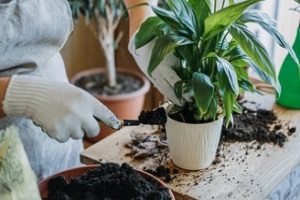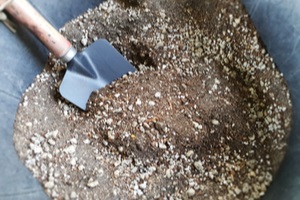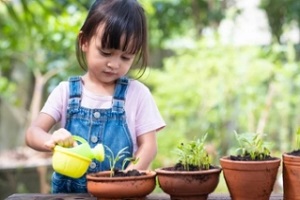 House plants do not come with the intimidation factor that is often associated with growing outdoor gardens, and many people think that going to their local garden store and buying the first bag of dirt they see or scooping some soil up from their garden and placing it in their pots is enough to establish the right growing conditions.
House plants do not come with the intimidation factor that is often associated with growing outdoor gardens, and many people think that going to their local garden store and buying the first bag of dirt they see or scooping some soil up from their garden and placing it in their pots is enough to establish the right growing conditions.
However, soil selection for house plants is a bit more complicated and involves considering the type of plant involved as well as the amount of water and sunlight best for the plant. Here is a look at some of the best types of soil that you can use for house plants.
All-Purpose Potting Soil
All-purpose potting soil is a type of generic soil mix that can be found at many price points and is generally suited to a broad range of house plants. This type of soil is good at holding moisture and it also drains well. It has a spongy and light texture and can be molded into clumps that can be easily broken apart. It is fertile and fairly neutral.
This is the best choice for those who wish to use one type of soil for multiple types of plants without worrying too much about the specifics. It is always good to keep this type of soil on hand as it is suited to such a broad range of house plants.
Organic Potting Soil
Organic potting soil is a type of soil that is made using all-natural materials that are sourced from plants and animals. Some of the ingredients that you might find in this type of soil include compost, decaying plant matter and worm castings. This is the preferred mix among those who wish to give their house plants an extra health boost. If you are growing herbs or other vegetables inside your house and want them to be organic, then this is the type of soil you need to use.
Indoor Potting Mix
An indoor potting mix is another good all-around option for houseplants, especially those that need loose soil that is well drained for placement in indirect sunlight. Many varieties use a non-bark, non-compost formula that drains quickly and contains coconut fiber or other materials to absorb and distribute water.
Cactus and Succulent Soil
 Cacti and succulents are very popular house plants these days thanks to their relative hands-off nature and unique appearance. However, these types of plants need soil with superior draining ability.
Cacti and succulents are very popular house plants these days thanks to their relative hands-off nature and unique appearance. However, these types of plants need soil with superior draining ability.
Cactus and succulent soil is a type of potting soil that has sand or other coarse amendments introduced to allow it to drain better. This is also a good type of soil to use for someone who tends to overwater their house plants, although it is important to keep in mind that it is slightly alkaline.
Seed Starting Mix
This type of soil is made for starting seeds. Although it is great at giving seeds the best conditions for initial growth, it is important to keep in mind that it does not provide a lot of nutrients to plants. If you are not starting seeds, you should avoid using this type of soil for your house plants.
Moisture-Controlling Potting Soil
Moisture-controlling potting soil is the preferred choice of plant owners who are concerned about their soil drying out. However, it is important to keep in mind that this mix uses chemically modified pellets to control moisture and stop the soil from drying out completely. This can cause problems with fungi and root rot, and it is not suitable for house plants that will be consumed, such as herbs.
Epiphyte Mix
Orchids and other types of weak-rooted epiphytes need to grow in a pot where they can be provided with structure as well as aeration. Epiphyte mix is acidic and infertile and often contains bark to provide the best growing conditions for these types of plants.
Avoid Topsoil
Avoid using topsoil, which often contains pathogens and bugs and can be so heavy that it suffocates house plants in containers.
Houseplant Soil FAQs
Here is a look at some common questions about houseplant soil.
What If You Don’t Have the Right Type of Soil?
 If you cannot find the type of soil you need for your house plants, you may choose to mix your own potting mix from scratch. This can be a more expensive approach because you will have to purchase several types of soil, but it can reap significant benefits when it comes to the health of your house plants. You can find information on the internet about the right mix to suit the needs of specific types of house plants, or get in touch with your local gardening center.
If you cannot find the type of soil you need for your house plants, you may choose to mix your own potting mix from scratch. This can be a more expensive approach because you will have to purchase several types of soil, but it can reap significant benefits when it comes to the health of your house plants. You can find information on the internet about the right mix to suit the needs of specific types of house plants, or get in touch with your local gardening center.
Many types of soil look alike, and it is not unusual to make a mistake and place the wrong soil in your pots. If you realize that you have mistakenly used the wrong soil after planting, all you need to do is re-pot the plant with the correct soil. Remove it from its pot, clean the roots off, clean the pot out thoroughly, and then replant it using the right soil.
Does Potting Soil Go Bad?
Some of the components found in potting soil can decompose over time, which leads to compaction as well as nutrient loss. Peat moss, for example, is especially vulnerable to decomposition. Moreover, used potting soil may become contaminated or develop soil pathogens. For this reason, experts recommend replacing potting soil at the start of each growing season and using any opened bags within six months. Unopened bags of soil can be kept for one or two years after purchase.
Can Potting Soil Be Reused?
It is possible to reuse potting soil if you approach it carefully. If the soil smells bad or contains mold, spread it out and place it in the sun to dry out so you can eliminate pathogens. Then, you can make the soil lighter by adding some fresh peat moss or coconut coir and introducing nutrient-rich additives such as earthworm castings or compost. You can place used soil from your house plants in flower beds or your compost pile. Be careful, however, not to reuse any soil that was in a container that held a diseased houseplant.
Get in Touch With Dirt Connections
Reach out to Dirt Connections for all of your Northern Virginia gardening needs. We provide a broad range of soil types and are happy to guide you toward the right materials for all of your home projects.
Summary

Dirt Connections was started with one goal in mind: providing quality residential and commercial construction services to clients on time and on budget. Reach out for more information on how we can support your next project.
For your convenience our estimates are free and by appointment. Call 703-940-9949 for a free estimate today!









































